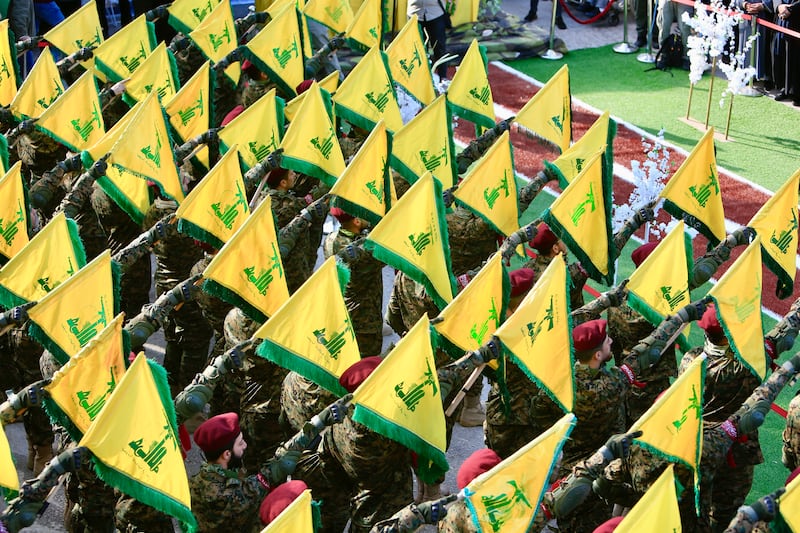Live updates: Follow the latest news on Israel-Gaza
For those living under the threat of deadly Hezbollah rocket fire in northern Israel the only enduring solution is to put “boots on the ground” in southern Lebanon, a retired Israeli general has told The National.
The fear of an infiltration by the Lebanese militant group's Radwan Force commandos has grown significantly since the Hamas-led October 7 attack, with villages preparing their own militias in defence.
That anxiety was evident as The National visited northern Galilee when a salvo of rockets struck the city of Safed killing a female soldier and wounding nine others.
It is that constant barrage that has led those living in the region to urge the government to consider mounting an invasion to remove the Hezbollah threat.
“It will be safe to go back home to live here only if Hezbollah suffer the strong hand of the Israeli military,” Retd Brig Gen Ilan Lavi told The National.
“There is no other choice, we cannot live near the border when Hezbollah can shoot direct fire into our houses.”
Cross-border clashes since October 8 on the border - when Hezbollah joined the latest war - have killed at least 268 people on the Lebanese side, most of them Hezbollah fighters but also 40 civilians, according to an AFP tally.
On the Israeli side, 10 soldiers and six civilians have been killed, according to the Israeli army.
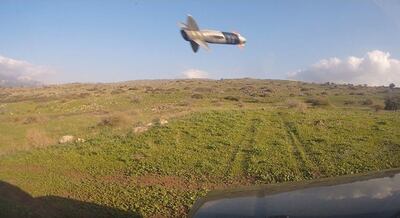
Israel has invaded southern Lebanon three times in recent decades, firstly in 1978 and 1982, targeting Palestinian militants who were firing rockets into Israel, fighting bloody counterinsurgency campaigns as it became embroiled in the country's complex civil war.
With the formation of Hezbollah during Israel's 1985-2000 occupation of the south of the country, Iran-backed Shiite militancy became entrenched along the border and in 2006, the group attacked Israeli forces, killing two and kidnapping three.
In the ensuing 34-day war and Israeli ground incursion, about 1,200 Lebanese were killed, mostly civilians, and about 165 Israelis died, mostly soldiers.
Radwan commandos
Since October 7 more than 60,000 Israelis from the north have been evacuated from their farms and homes that sit within five kilometres of Lebanon’s border.
But there is a growing worry that Hezbollah could launch an attack with its 150,000 Iran-supplied missiles alongside a major ground infiltration.
That would be conducted by its force of 3,000 Radwan fighters who are well trained, many with combat experience from Syria’s civil war.
The force splits down into groups of about 25 who travel on quad bikes and SUVs to infiltrate towns around the border. “These are elite commando soldiers, it’s not a simple force, it's a strong force, different to Hamas,” said Brig Gen Lavi, former chief of staff for Israel’s Northern Command.
Sarit Zehavi, a former lieutenant colonel in Israeli intelligence, said the Radwan were much more skilled than the Hamas force that attacked on October 7.
“Hezbollah’s warriors are a more experienced and professional army because of what they did in Syria and if they invaded Israel and we are not prepared, it will be much more successful.”
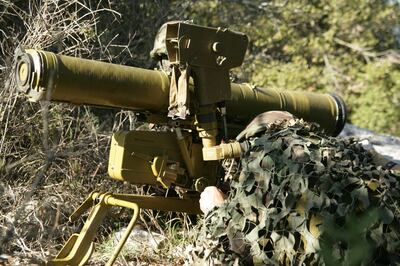
Land attack
It is that fear of a force of more than 60,000 Hezbollah fighters with their huge missile arsenal, where a “simple anti-tank missile can penetrate the window of my bedroom” said one resident, that has pushed thinking towards a pre-emptive attack.
“The only way it can be resolved is if Israel removes Hezbollah as a military entity,” said Brig Gen Lavi, who has two children serving in the Israeli army.
“There can be a limited war using our strike capabilities without putting boots on the ground and then there can be boots on the ground.”
“Israel has a lot of capabilities but ultimately if you want to win a war to win, you need to put boots on the ground. You cannot win wars only by striking from the air, but with boots on ground you do pay a price with casualties.”
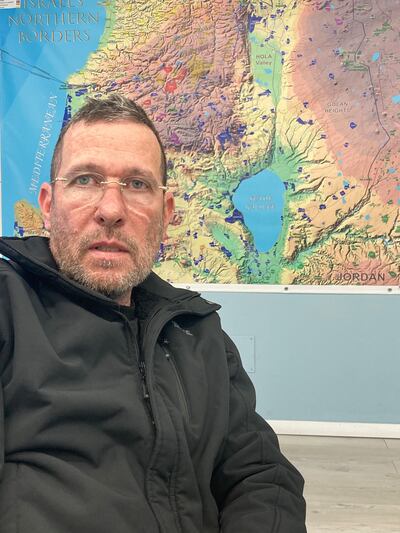
The US and France are leading efforts to bring a ceasefire into place to allow the displaced Israeli population to return home, with an eye to further talks on border demarcation and pulling militias back from the border. But even a truce will not bring an enduring peace to the region, argued Ms Zehavi.
“The problem is that the ceasefire now being engineered, is a ceasefire that is not going to be a solution,” she said. “It's going to be just a ceasefire.”
The founder of the Alma Research Centre, that analyses open source intelligence, said Hezbollah’s desire was for a ceasefire that would remove most of the three Israeli divisions deployed to the border.
“It’s to make us go to sleep, to deceive us then Hezbollah will choose the timing of an invasion,” she warned. “Meanwhile who is going to go back and live in the country if this problem is not solved?”
Rapid response
The first force to combat an infiltration would be the civilian defenders known as the Rapid Reaction Force (RRF).
More than 1,000 of these militiamen sit in control rooms and patrol their towns on a 24-hour basis while still maintaining jobs as farmers or IT specialists.
“If there is an infiltration, then we want to contain it,” said Sivan Yechieli, leader of the Kfar Vradim RRF that is less than 9km from the border.
“It's like an energy wave that comes in and we absorb some of that energy to slow it down, especially in a killing spree.”
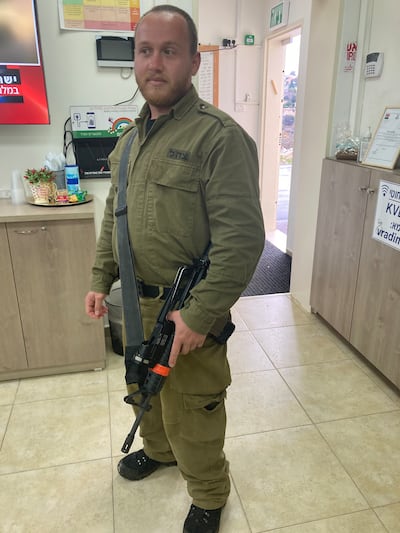
Armed with semi-automatic weapons, radios and a local knowledge of the terrain, the RRF has a constant patrol out ready to react.
During the October 7 assaults a quick reacting RRF at the Nir Am kibbutz, a team of 12 aged from 26 to 59 years old, fended off the attackers for three hours.
“Armed people who can cope and actually engage the enemy makes a huge difference,” said Mr Yechieli, speaking at the operational centre just minutes before a Zoom call with his investment company. “If you're ready rather than looking for your weapons the results are much different.”
Existential fear
Just before the drive to an army base a few kilometres from the border, The National was briefed that the road was under regular attack by anti-tank missiles that cannot be intercepted by the Iron Dome defence system.
“They are very accurate and very scary,” said Ms Zehavi, standing next a dashcam picture of a missile in mid-flight missing a car by just two metres.
She suggested we take a zigzag mountainous route among the olive groves rather than the relative danger of the straight road.
As a result of the retaliatory air strikes, the Israeli military called the trip off, but for a moment this reporter had a glimpse into the anxiety experienced daily.

“It's an existential fear,” said Ms Zehavi. “As a mother, since October 7 I get up every morning and I look at my little girl and say: ‘I don't know how this day is going to end’.”
While the tension was always there, it was something people learnt to live with, said Mr Yechieli.
“The fear level, we get used to it,” he said. “It's like an earthquake or volcano eruption, at the beginning you think it's inconceivable then people just try to get back to their lives but they still remain afraid.”
